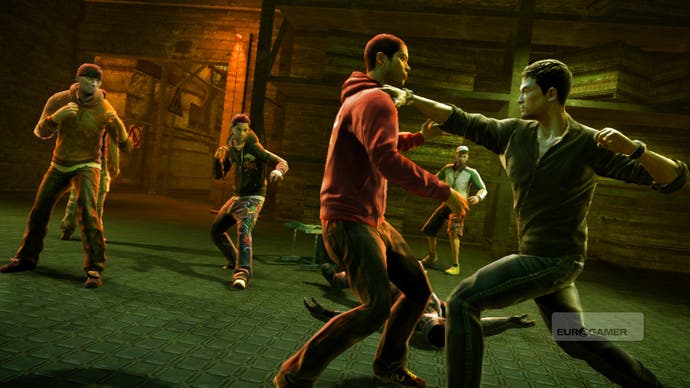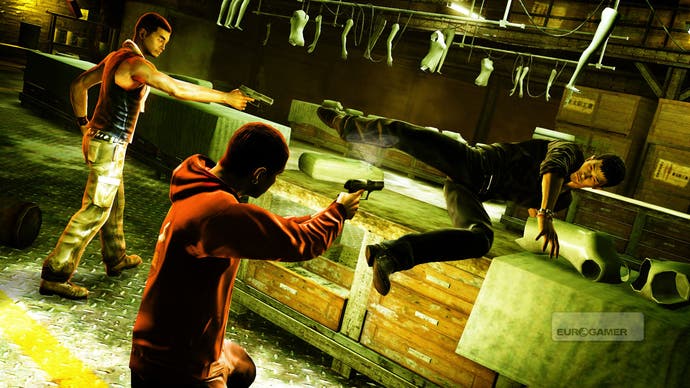True Crime
Putting the reboot in.
North Point couldn't be mistaken for a neighbourhood in your typical open-world American city. The neon signs lining the streets feature Cantonese characters, while strings of red Chinese lanterns hang in the alleyways. This is a brightly coloured rather than grey urban environment, painted with a pallette of rich reds, golds and greens.
Wei zooms down major highways and zips through back alleys with the carefree abandon only a man whose name is not on the insurance can enjoy. The style of the driving model is clearly closer to arcade than simulation. "There are a lot of guys on the team from Need for Speed," confirms O'Connell, mentioning Burnout as another influence.
Wei pulls up outside the heroin plant and gets out of the car. He quickly dispatches a bloke standing guard outside the entrance, throwing him to the ground then chucking him in a nearby dumpster. There are more enemies waiting inside, and Wei makes good use of them to demonstrate his wide range of kicks, throws and punches. He also shows off some environmental kills, slamming one man's head in a freezer door and throwing another one into some kind of electrical grid.
Icons such as exclamation marks and Y button symbols appear over enemies' heads during fights, and we're told this is to indicate the fact that Wei has an opportunity to counter attack. Van der Mescht agrees that it's a similar system to the one featured in Arkham Asylum. However, he says, United Front had the idea before that game was released, and the real inspiration for the fighting mechanics came from Hong Kong cinema.

"We wanted to create a combat system that had a lot more depth and was a lot more robust than anything that exists out there in the open-world genre. You have a number of offensive and defensive capabilities, there are combo chains, there's a counter system. We've really brought the environment into play as much as possible and that's pervasive throughout the world. There's a huge range of stuff you can do."
Such as pick up a meat cleaver and thunk it into a man's chest, as is being demonstrated now. ("Cleavers are the weapon of choice for actual Triads in Hong Kong," says O'Connell.) Or grab a pistol, pop out from cover and shoot an oil barrel to generate a giant ball of flame. And then vault over a bench and up a stack of crates, guns blazing all the while.
This is accomplished thanks to True Crime's free running system. Approach an applicable object (as indicated by orange highlights) while pressing A and Wei will perform a fluid vault, climbing move or wall run, depending on the context. Get the timing wrong and he'll slam up against the object in a crumpled mess, and worst of all, he'll lose face.

The face meter, as it's called, is cited as one of the main elements which differentiates True Crime from other open-world games. According to O'Connell, "Face is a term used in China, especially in Hong Kong, which means the outward projection of your social standing through your wealth. It could be the clothes you wear or the car you drive." In the context of this game, you fill up your face meter by doing things like performing smooth free running moves or pulling off successful environmental kills.
The advantage of having good face is that people in the world react to you differently. It can scare off would-be attackers, for example. Certain characters will only give you information or offer you side missions when you've earned enough face to match the level they're at. However, you can pretty much ignore the system if you prefer - "The story has a linear progression and if you want to power through it, that option's there for you," confirms O'Connell.
But let's get back to that free running system. Has United Front taken any inspiration from the likes of Assassin's Creed and Mirror's Edge? "Lots," says Van der Mescht. "But our free running has been way more inspired by realistic scenarios, as opposed to running along rooftops or jumping from beam to beam."

